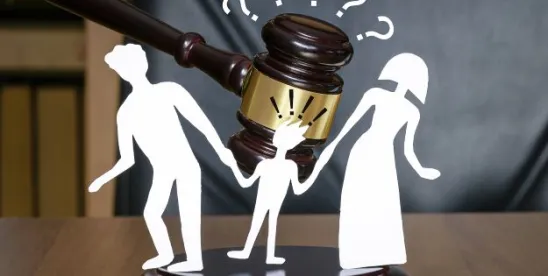Ever make a decision by flipping a coin?
It seems like a reasonable option to decide where to have dinner or which movie to see, but not so pragmatic in major decisions involving your minor children. In a family of divorce, disagreements such as whether your child will be vaccinated, whether they are to attend private or public school, whether they should take medication, or to what extent religion should be incorporated into their upbringing are plentiful. So, are you destined for a life of contention and deadlock with your co-parent? Not necessarily.
Understanding Physical and Legal Custody
"Physical custody" and "legal custody" are terms of art, used in the legal world to differentiate between the physical day-to-day parenting rights versus the right and responsibility to make decisions with important and long-term implications for a child's best interest and welfare. Although not expressly defined in North Carolina, legal custody encompasses areas such as health care, education, and religious upbringing of a minor child. The presumption is that the father and mother exercise joint legal custody with a separate physical custodial schedule; however, in the event parents continuously disagree on matters impacting the children's longstanding welfare, parents can seek court guidance.
Factors Courts Consider in Custody Disputes: Case Examples
Trial courts can consider an array of factors to determine what is in the best interest of the child, including granting one parent all legal decision-making authority to establishing areas in which one parent will retain sole discretion, such as healthcare or education. The courts consider a "totality of the circumstances." Frequent arguments, standing alone, will not abrogate a parent's legal custodial rights.
Consider the following North Carolina trial court cases discussing legal custody, all affirmed by the Court of Appeals:
- Religious Upbringing: Father was awarded sole decision-making ability regarding the child's religious upbringing. The court considered the child's anxiety and stress from the mother's remarks about the father's religion, the child's exposure to two competing religions, the mother's failure to cooperate and facilitate communication between father and child, and that the child suffered symptoms of physical illness caused by stress related to parents' conflict resulting in therapeutic recommendations.
- Commitment to Child’s Welfare: Mother was awarded primary legal custody of the minor child based on the mother's commitment to the well-roundness of the minor child, including exposing the minor child to a number of new friends in outdoor settings during COVID-19, limiting their work schedule to care for the children, making health and balanced food for the child, and organizing all healthcare appointments.
- Disregard for Timely Communication: Father was awarded final decision-making authority on all issues should parents not be able to timely resolve a matter after consultation with their parenting coordinator. Historically, the mother had "dragged her feet, not been responsive, was adversarial, and not responding in a timely manner,” which was not in the minor child's best interests.
- Impact of Poor Communication: Mother was awarded final decision-making authority on all major issues involving minor children after granting both parents joint legal custody, and the mother primary physical custody. The Court determined that the mother had more one-on-one interaction with the minor children's school, the mother and father had not been able to co-parent effectively, and one of the minor children was significantly impacted by the mother and father's inability to communicate.
- Child Caught in Parental Conflict: Mother was awarded sole decision-making authority if the parties could not agree. The court detailed past disagreements by the parties reflecting their inability to communicate and the effect their contentious communications had on the child, including that the “[Father] will tell the child that [Mother] is to blame for him not getting to do what he wants” and that the child will “be put in the middle and have either parent tell him it is the other's fault he can't get his way.” Father was also frequently curt, condescending, and rude to the mother in the presence of the minor child.
- Neglect of Health and Education Plans: Mother was granted sole legal and physical custody when the husband had a pattern of failing to follow his son's doctor's behavior and safety plan and failed to support the minor child's therapy and therapeutic strategies, resulting in discontinued services, failed to adhere to the minor child's IEP, among other shortfalls.
- Limits of Sole Authority: However, the trial court did abuse its discretion in granting the mother sole medical educational decision-making authority over the minor child. Disagreements over whether to administer ADHD medication to the minor child, standing alone, did not abrogate the father's joint legal custody over the minor child's healthcare, nor did disagreements concerning after-school care abrogate the father's joint legal custody as to the minor child's education.
The Role of Third Parties in High-Conflict Custody Cases
North Carolina Courts can require that parents consult a third party, such as a therapist, or they can appoint a parenting coordinator to help resolve disputes or assist in complying with the court's custody order. The parenting coordinator's authority may include but is not limited to several important areas: transition time, pickup or delivery, method of pickup and delivering, sharing of vacations and holidays, bedtimes, childcare, diet, clothing, recreation, extracurricular activities, discipline, telephone contact, among many others. The parenting coordinator shall decide any issue within the scope of the parenting coordinator's authority, and the decision shall be enforceable as an order of the court. For high-conflict custody cases, engaging a neutral third party to assist in decision making may be the way to go.
Conclusion: Serving the Best Interest of the Child
In sum, North Carolina law requires the court to award custody, including legal custody, of a minor child to the person that "will best promote the interest and welfare of the child(ren)."




 />i
/>i
